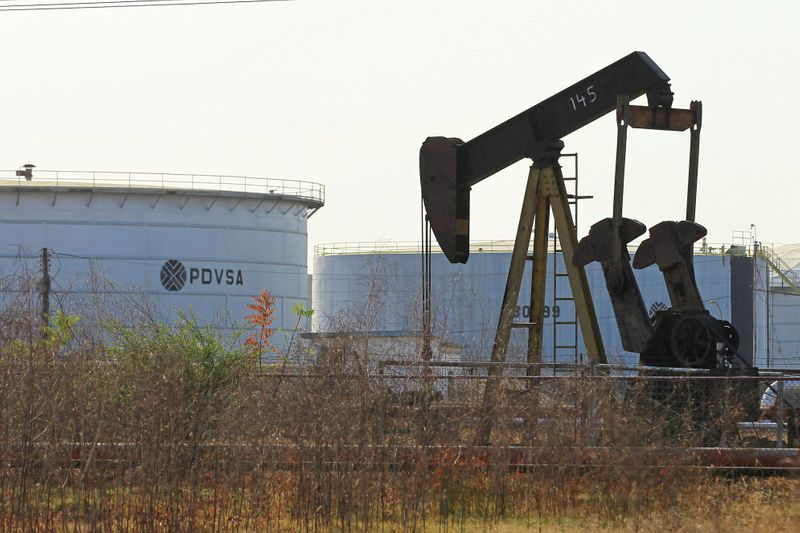By Marianna Parraga and Nidhi Verma
MEXICO CITY/NEW DELHI (Reuters) - A handful of long-term customers of Venezuela's PDVSA have begun winding down oil trade with the state-run company by scheduling the last cargoes to depart from the sanctioned country ahead of a U.S. deadline, five sources close to the decisions told Reuters.
The U.S. government has given the firms - which include Spain's Repsol (MC:REP), Italy's Eni (MI:ENI), India's Reliance Industries (NS:RELI) and Thailand's Tipco Asphalt (BK:TASCO) - deadlines ranging between October and November for ending exemptions to the sanctions allowing some companies still to receive Venezuelan oil, the sources said.
With U.S. elections looming in November, the Trump administration is seeking to raise the heat on Venezuelan President Nicolas Maduro, whose 2018 re-election was not recognized by most Western nations.
Repsol, which since late 2018 had been receiving crude under a swap deal with PDVSA authorized by the U.S. Treasury Department allowing the Spanish company to cash pending debt, received its most recent cargo of Venezuelan oil this month on tanker Delta Ios, according to PDVSA's exports schedules.
The company does not plan to charter a new vessel to pick up Venezuelan crude after October, a company source said. In response to Reuters' questions, a Repsol spokesman said the firm "abides by the international norms in force and will keep on abiding."
Eni, currently receiving crude under a similar swap deal, plans to take a Venezuelan oil cargo later this month on tanker Delta Captain and probably another in October before temporarily ending trade, according to PDVSA's documents and a company source.
A spokesperson for Eni declined to comment on specific cargoes, but said the company "is operating and will operate in full compliance with applicable sanctions regulations and in continuous dialogue with the relevant authorities."
Thailand's Tipco Asphalt has three more cargoes of Venezuelan heavy crude scheduled to load through October, all of them bound for its Kemaman refinery in Malaysia, according to the documents and a company source.
Tipco Asphalt said in a letter to Thailand's stock exchange this month that the U.S. State Department had contacted the firm in August asking it to wind down procurement of Venezuelan oil by the end of November, warning the company that it could be subject to U.S. sanctions in the event of non-compliance.
Tipco added this it was "taking steps to comply with such request," including a temporary shutdown of its Kemaman refinery until finding alternative oil supplies.
The company did not immediately respond to an emailed request for further comment.
And Reliance Industries, which in July received a temporary U.S. authorization to swap Venezuelan oil for diesel for the OPEC-member nation, has received some 4 million barrels of Venezuelan crude so far this month and plans to import almost 5 million barrels more in the coming weeks, the PDVSA documents showed.
A source close to Reliance's plans said the firm will halt imports of Venezuelan oil in November and also shipments of diesel to the nation after a cargo currently on its way.
The pause would last for at least two months and a decision on whether to resume the trade would be taken after the U.S. election.
Reliance and PDVSA did not reply to requests for comment.
NEW ALLIES
As PDVSA's pool of traditional customers has shrunk since last year due to sanctions, sales to mostly unknown or inexperienced firms accused by Washington of acting as shell companies have partially replaced them. A large portion of the crude taken by these firms ends up in China.
Venezuela has also received help from Iran this year as trade between the two sanctioned nations has deepened. A large tanker that delivered Iranian condensate to PDVSA earlier this month is now loading Venezuelan crude for Iran's national oil company.
It is yet unknown if Washington will resume authorizing PDVSA's customers to take Venezuelan oil under swap deals.
The U.S. Treasury Department declined to comment.
U.S. special envoy for Venezuela and Iran, Elliott Abrams, told Reuters that sanctions are "increasingly effective in denying revenue" to Maduro's administration.
"Around the globe, leading companies are abiding by our sanctions, and acting responsibly and transparently. We appreciate their cooperation," he added.
Even though scheduled cargoes of Venezuelan crude for Repsol, Eni, Tipco and Reliance are expected to finish soon once authorizations granted by Washington expire, the exchanged fuels most of these companies are delivering to PDVSA have continued arriving in Venezuelan ports, the documents also showed.

Venezuela expects the arrival this month of about 820,000 barrels of Iranian gasoline on tankers Forest, Faxon and Fortune, currently crossing the Atlantic Ocean.